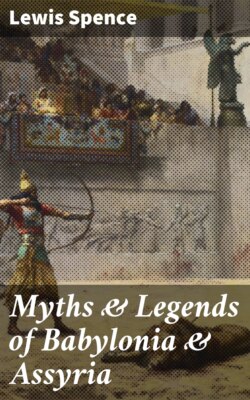Читать книгу Myths & Legends of Babylonia & Assyria - Lewis Spence - Страница 27
На сайте Литреса книга снята с продажи.
Nimrod, the Mighty Hunter
ОглавлениеIt is strange that the dispersion of tribes at Babel should be connected with the name of Nimrod, who figures in Biblical as well as Babylonian tradition as a mighty hunter. Epiphanius states that from the very foundation of this city (Babylon) there commenced an immediate scene of conspiracy, sedition, and tyranny, which was carried on by Nimrod, the son of Chus the Æthiop. Around this dim legendary figure a great deal of learned controversy has raged. Before we examine his legendary and mythological significance, let us see what legend and Scripture say of him. In the Book of Genesis (chap. x, 8, ff.) he is mentioned as "a mighty hunter before Yahweh: wherefore it is said, Even as Nimrod the mighty hunter before the Lord." He was also the ruler of a great kingdom. "The beginning of his kingdom was Babel, and Erech, and Accad, and Calneh in the land of Shinar. Out of that land went forth Asshur" (that is, by compulsion of Nimrod) "and builded Nineveh," and other great cities. In the Scriptures Nimrod is mentioned as a descendant of Ham, but this may arise from the reading of his father's name as Cush, which in the Scriptures indicates a coloured race. The name may possibly be Cash and should relate to the Cassites.
It appears then that the sons of Cush or Chus, the Cassites, according to legend, did not partake of the general division of the human race after the fall of Babel, but under the leadership of Nimrod himself remained where they were. After the dispersion, Nimrod built Babylon and fortified the territory around it. It is also said that he built Nineveh and trespassed upon the land of Asshur, so that at last he forced Asshur to quit that territory.[3] The Greeks gave him the name of Nebrod or Nebros, and preserved or invented many tales concerning him and his apostasy, and concerning the tower which he is supposed to have erected. He is described as a gigantic person of mighty bearing, and a contemner of everything divine; his followers are represented as being equally presumptuous and overbearing. In fact he seems to have appeared to the Greeks very much like one of their own Titans.
Nimrod has been identified both with Merodach, the tutelar god of Babylon, and with Gilgamesh, the hero of the epic of that name, with Orion, and with others. The name, according to Petrie, has even been found in Egyptian documents of the XXII Dynasty as 'Nemart.'
Nimrod seems to be one of those giants who rage against the gods, as do the Titans of Greek myth and the Jotunn of Scandinavian story. All are in fact earth-gods, the disorderly forces of nature, who were defeated by the deities who stood for law and order. The derivation of the name Nimrod may mean 'rebel.' In all his later legends, for instance, those of them that are related by Philo in his De Gigantibus (a title which proves that Nimrod was connected with the giant race by tradition), he appears as treacherous and untrustworthy. The theory that he is Merodach has no real foundation either in scholarship or probability. As a matter of fact the Nimrod legend seems to be very much more archaic than any piece of tradition connected with Merodach, who indeed is a god of no very great antiquity.
